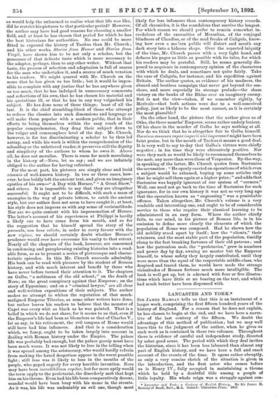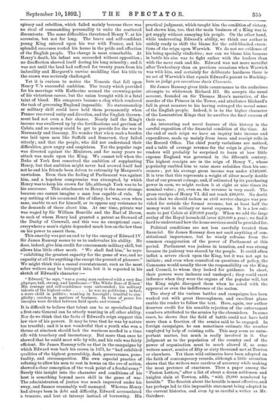LANCASTER AND YORK.*
SIR JAMES RAMSAY tells us that this is an instalment of a larger work, comprising the first fifteen hundred years of the history of England. For a reason that he does not explain, he has chosen to begin at the end, and we have here a narra- tive of the last century of the fifteen. We doubt the advantage of this method of publication; but we may well leave this to the judgment of the author, when he gives us such work as is contained in these two volumes. Throughout there is evidence of careful and independent study, directed by sober good sense. The period with which they deal invites the historian, since it has been less laboured than almost any part of English history, and we have here a full and exact account of the events of the time. It opens rather abruptly, as only a very concise sketch of the situation is given in the introduction, and the first actor who comes before us is Henry IV., fully occupied in maintaining a throne which he held by a doubtful title among a people of little loyalty. His whole reign was a struggle against eon-
* Lancaster and York : a Century of English History. By Sir James Ramsay of Banff, Bart., M.L. Oxford : Clarendon Press. 1892.
spiracy and rebellion, which failed mainly because there was no rival of commanding personality to unite the scattered discontents. The same difficulties threatened Henry V. at his accession, but not for long. The brave and self-confident young King entered upon his war with France, and his splendid successes rooted his house in the pride and affection of the English people. The change is most remarkable. At Henry's death, his infant son succeeded without opposition ; no disaffection showed itself during his long minority ; and it was not until the land had suffered for twenty years from his imbecility and Margaret's unwise meddling that his title to the crown was seriously challenged.
Yet it is curious to notice the Nemesis that fell upon Henry V.'s successful ambition. The treaty which provided for his marriage with Katherine seemed the crowning-point of his victorious career, but the union brought with it a fatal taint of blood. His conquests became a clog which rendered the task of governing England impossible. No statesmanship or military skill could have held them permanently when France recovered unity and direction, and the English Govern- ment had not even a fair chance. Nearly half the King's income was swallowed up by the fortifications and garrison of Calais, and no money could be got to provide for the war in Normandy and Gascony. No wonder that when snail a burden was laid upon men like Suffolk and Somerset, they failed utterly ; and that the people, who did not understand their difficulties, grew angry and suspicious. Yet the popular rage was directed against the Ministers, and for many years no attack was made upon the King. We cannot tell when the Duke of York first conceived the ambition of supplanting Henry, but that ambition might never had avowed itself had not he and his friends been driven to extremity by Margaret's unwisdom. Even then the feeling of Parliament was against him, and a hopeless compromise was attempted, by which Henry was to keep his crown for life, although York was to be his successor. This attachment to Henry is the more strange because one cannot imagine a man less capable of rule. To say nothing of his occasional fits of idiocy, he was, even when sane, unable to act for himself, or to oppose any resistance to the demands of those about him. At one time, private war was waged by Sir William Bonville and the Earl of Devon, to each of whom Henry had granted a patent as Steward of the Duchy of Cornwall, and this was no exceptional case; everywhere a man's rights depended much less on the law than on his power to assert them.
This anarchy was put an end to by the energy of Edward IV.
Sir James Ramsay seems to us to undervalue his ability. He does, indeed, give him credit for consummate military skill, but allows him little other merit. " We shall find him," he says, " exhibiting the greatest capacity for the game of war, and no capacity at all for anything else except the pursuit of pleasure."
We might think this a casual overstatement, such as the most sober writers may be betrayed into, but it is repeated in his sketch of Edward's character :—
" Edward," he says," was a young man endowed with a very fine physique, tall, strong, and handsome—' The White Rose of Rouen.' His courage and self-confidence were unbounded ; his military talents of the highest order he was no politician ; in fact, a mere child in politics ; wanting in foresight ; trustful to sim- plicity; careless in matters of business. In time of, peace his energies were divided between field sports and women.'
It is difficult to believe that talent can be so specialised that a first-rate General can be utterly wanting in all other ability.
Nor do we think that the facts of Edward's reign support this low view of his powers. It may be true that he was by nature too trustful; and it is not wonderful that a youth who won a throne at nineteen should lack the wariness needed in a time rife with treachery and inconstancy. But more than once he showed that he could meet wile by wile, and his rule was fairly efficient. Sir James Ramsay tells us that in the campaigns by which Edward won back his crown in 1471, he "had exhibited qualities of the highest generalship, dash, perseverance, punc- tuality, and circumspection. His own especial practice of refusing to allow his men to rest in towns on the eve of action, showed a clear conception of the weak point of a feudal army." Surely this insight into the character and conditions of his host is something beyond mere skill in the game of war. The administration of justice was much improved under his sway, and finance reasonably well managed. Whereas Henry had always been in debt and difficulty, Edward accumulated a treasure, and lent at interest instead of borrowing. His practical judgment, which taught him the condition of victory, had shown him, too, that the main business of a King was to get supply without annoying his people. On the other hand, while underrating Edward's ability, we think our author is unduly ready to shift the blame for the cold-blooded execu- tions of the reign upon Warwick. We do not see evidence of his being specially vindictive; nor can we blame him because in battle his aim was to fight rather with the leaders than with the mere rank and file. Edward was not more merciful after Tewkesbury than on previous occasions when Warwick was with him, and certainly for deliberate hardness there is no act of Warwick's that equals Edward's patent to Bucking. ham as judge pro execution duds Clarencie.
Sir James Ramsay gives little countenance to the audacious attempts to whitewash Richard III. He accepts the usual account, founded on Sir Thomas More's narrative, of the murder of the Princes in the Tower, and attributes Richard's fall in great measure to his having outraged the moral sense of the English people. Indeed, it is to the higher character of the Lancastrian Kings that he ascribes the final success of their race.
An interesting and novel feature of this history is the careful exposition of the financial condition of the time. At the end of each reign we have an inquiry into income and expenditure, made up mainly from issue and receipt rolls in the Record Office. The chief yearly variations are noticed, and a table of average revenue for the reign is given. Our readers will probably be surprised to learn at how little expense England was governed in the fifteenth century. The highest receipts are in the reign of Henry V., whose popularity enabled him to raise more subsidies than his suc- cessors ; yet his average gross income was under £140,000. It is true that this represents a weight of silver nearly double that of our present coinage, and, if estimated by its purchasing power in corn, we might reckon it at eight or nine times its nominal value ; yet, even so, the revenue is very small. The gross receipts of Henry VI. did not reach £80,000. No doubt much that we should reckon as civil service charges was pro- vided for outside the formal revenue, but at least half the money went in military or naval expenses. It is a low esti- mate to put Calais at £30,000 yearly. When we add the large outlay of the Royal household (over £20,000 a year), we find it hard to understand how the home services could be provided for.
Political conditions are not less carefully treated than financial. Sir James Ramsay does not omit anything of con- stitutional importance, but he wisely refrains from the common exaggeration of the power of Parliament at this period. Parliament was jealous in taxation, and was strong because its jealousy was shared by the people. It could often inflict a severe check upon the King, but it was not apt to initiate ; and even when consulted on questions of policy, the Commons would usually throw the responsibility on the King and Council, to whom they looked for guidance. In short, their powers were inchoate and unshaped ; they could exert influence when they were the organs of the popular will, but the King might disregard them when he acted with the approval or even the indifference of the nation.
The story of the various battles and campaigns has been worked out with great thoroughness, and excellent plans enable the reader to follow the text. Here, again, our author deserves credit for his sensible rejection of the extravagant numbers attributed to the armies by the chroniclers. In some cases, he shows that the field of battle could not have held more than a fraction of the armies said to be engaged. In foreign campaigns, he can sometimes estimate the number employed by help of existing rolls. This may seem an unim- portant matter, but much is really involved in it. Our judgment as to the population of the country and of the power of organisation must be much altered if, as some writers assert, armies of fifty or sixty thousand met at Towton or elsewhere. Yet these wild estimates have been adopted on the faith of contemporary records, although a little attention shows that the writers were careless of accuracy while making the most pretence of exactness. Thus a paper among the " Paston. Letters," after a list of about a dozen noblemen and knights slain at Towton, adds, " with 28,000 numbered by heralds." The flourish about the heralds is most effective, and has perhaps led to this impossible statement being adopted in the current histories, and even by so careful a writer as Mr. Gairdner. In all respects, these volumes are a most valuable contribu- tion to English history, and we look forward with hope to the speedy completion of the great work. We could wish the style were a little freer and more personal. At present the author is too ready, with characteristic modesty, to shelter him- self under quotations from other writers, when his direct utterance would be more effective, and would spare us the irritation of many inverted commas. And in spite of our respect and admiration, we are obliged to end with a grumble. Even an instalment, if it be an instalment of this importance, should certainly have an index.




































 Previous page
Previous page